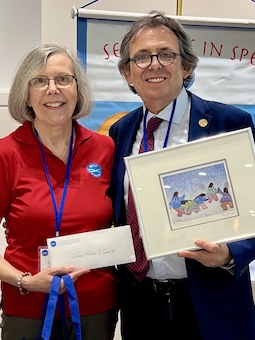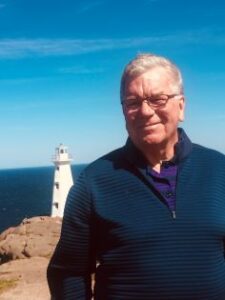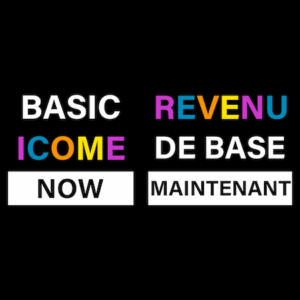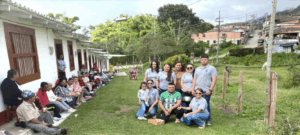Any entity looking to sustain its operations must work through the winds of change. The smart choices it makes to leverage opportunities determine how it thrives or survives an ever-changing landscape.
In the business world, changes give reasons for a host of reality checks – restructure the organization, pursue larger market share, drop product lines, reinvent business models or change its mission. Changes all entities navigate can either be externally and/or internally driven. These entities either react to and harness them or take on the role of change agents.
“Evolving in Today’s World” was the theme to this year’s Annual National Formation (ANF). Held on June 19-21 at McMaster University in Hamilton, the national gathering drew 156 members across Canada.
Here are a few takeaways, piecing together plenary and workshop sessions attended. Sessions described here do not follow the sequence these sessions were presented but observe the following structure: Historical Context and Pursuit to Renew, Core Values and Poverty Barriers, Being Catalyst through Advocacy, and A Forward-Looking View.
Plenary Session: “Adapting to a Changing World through the Eyes of Frédéric Ozanam”
Ray Sickinger and Tim Williams (SVdP USA National Formation) offered a compelling reflection: “How did Frédéric Ozanam and his co-founders – all activists – adapt to such a changing world?” They traced the Society’s founding during a time of immense upheaval—marked by the French revolution, epidemics, and widespread poverty—and how it led to transformational action. The session highlighted our founders came through a mission now nurtured through generations, and transcending borders. Eleven practical adaptations made by the early Society were presented—from prioritizing quality of service, holding regular reviews to improve works, to working with governments, and emphasizing spiritual as well as physical needs. The speakers emphasized “our greatest gift is ourselves, our presence.”
Plenary Sessions: “Communicating and Living with Compassion across Poverty Barriers”
In powerful personal testimonies, Dr. Donna Beegle and Elia Hernandez-Moreno, poverty experts and community supporters, reminded members “context may be different, but poverty is the same.” Dr. Beegle reflected on her lived experience of generational poverty, punctuated by homelessness and family member incarcerations, and challenged us to reframe poverty as a deficiency of resources, not of the person: “Any actions we take is against poverty since it is deficient, not the person who is in it.” Elia Hernandez-Moreno drawing upon her poverty/homelessness simulation experience emphasized the need to serve from a place of authenticity and rest: “Permission to rest allows us to empty ourselves of busyness and weariness, and thereafter to recover.” This may be required since at times we experience “compassion fatigue” – a feeling of weariness when outcomes do not come quickly; this allows us to go on assimilating to know more about poverty, to be more in touch and better serve them. Both speakers reinforced the value of empathy, networks, and expectation-setting, urging members to be “a blessing and value to those we serve.”
Workshop Sessions: Advocacy as a Response to Systemic Injustice
In line with Frédéric Ozanam’s belief in liberal Christian democracy, all three break-out sessions (“Hey…What is the Basic Income Guarantee (BIG) Idea?”, “Today’s Housing Crisis and What We can do About It?”, and “Why is Prison Ministry a Fundamental Role in the Evolution of the Society?”) envisioned the need to turn our attention more toward advocacy to demonstrably meet the challenges of our times. By representing the voice of others, advocacy takes forms of asking layers of government for commitment to specific action, issue, policy change, accountability, funding level or solution through letter-writing (at the minimum), arguing the case for fairness and unequivocally explaining positions, holding candid discussions, or looking for significant impact on communities and the society at large. It advances specific causes and helps to inform and empower the public.
Hence, presenters addressed key issues—Basic Income Guarantee (BIG) to resolve income insecurity, housing crisis along with worsening homelessness, and prison reform—offering data, context, and calls to act. The PEI BIG project was hailed as “ground-breaking,” offering the first costed proposal in Canada. On housing, Syl Roach challenged members to “educate ourselves and our associations” after walking attendees through eviction tactics by landlord and entities, and tenant rights. Deacon Dunn reminded “our correctional system is broken… warehousing the homeless, addicted and mentally ill”, of prison systems, particularly Ontario’s, operating at capacities way beyond (113% in 2023 and rising) the optimum level of 90%, and of current remand system – those waiting for bail hearing and for trial – where 80% in 2022 (also rising) of incarcerated is held.
Plenary Session: “Strategic Planning – The Future of the Society”
This session provided a forward-looking view of the Society’s evolution, presenting findings from this year’s national survey and listening sessions aimed at shaping the strategic plan through 2026. Denise Ouellette and Lizzie Lappin revealed “three critical issues facing SSVP Canada” that emerged: 1. youth recruitment and retention, 2. leadership development, and 3. Relationship with the Church and Parishes. By March 2026, analysis of survey data and listening sessions will be completed… and the national strategic plan will be presented at the June 2026 ANF. The session called members to actively engage in this process to ensure the plan is framed by real community voices.
Unlike with entities in the business world, our mission endures. As the SVdP USA speakers reminded us, too: “The Society constantly strives for renewal, adapting to changing world conditions. It seeks to be ever aware of the changes that occur in human society and the new types of poverty that may be identified or anticipated.” To meet this call, members must go beyond insight and take bold action. These sessions might have given the lens, toolbox and confidence to navigate changes. However, more specific tools, information, resources, networks, strategies and how-to advocate need to be widely shared and promoted with all members.
The Entire Society should act boldly and immediately on defined issues—adaptation must be active, not passive.
Only then, in the words of Dr. Beegle, in concluding her presentation, SSVP may continue making a difference. Where the prudent path leads us to follows what we all together embark on now.
Jose I. Torres, CPA
Peel North Particular Council President/Greater Toronto Central Council
For complete 2025 ANF presentations, please click: https://ssvp.ca/members/anf/









